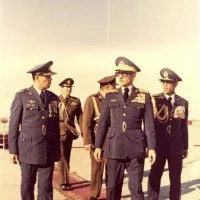Born into a humble farming family on July 6, 1935, Lhamo Dhondup (Tenzin Gyatso), had subtle beginnings before he became the leader of an entire people. After the thirteenth Dalai Lama’s passing, the high lamas searched for his next reincarnation among the Tibetan people. Tibetan Buddhists monks journeyed to a small village and found a… Read More "The Charismatic Dalai Lama"
The Rise to Power of the Butcher of Uganda
Idi Amin Dada, who came to be known as the “Butcher of Uganda,” rose to officer rank in the Ugandan Army before its independence from British colonial administration in 1962. Associated with the newly-sovereign nation’s President and Prime Minister Milton Obote, he staged a military coup and usurped the role of president on January 25,… Read More "The Rise to Power of the Butcher of Uganda"
Kyrgyzstan After Independence – An Unfulfilled Promise
After the collapse of the USSR, Kyrgyzstan, despite its isolation and lack of development, was considered to be one of the more promising newly independent states, “the Switzerland of Central Asia” with its mountains, pragmatic president, and relative lack of ethnic tensions or repression. The U.S. and others poured in aid to help establish free… Read More "Kyrgyzstan After Independence – An Unfulfilled Promise"
Admitting the Shah to the U.S.: Every Form of Refuge has its Price
Mohammed Reza Pahlavi, the Shah of Iran, departed Iran on January 16, 1979, fleeing political unrest led by the Ayatollah Khomeini and seeking medical treatment for lymphoma. Pahlavi first flew to Aswan, Egypt, where Anwar Sadat welcomed him, and would spend the next ten months moving among Morocco, Mexico, the Bahamas and Panama while requesting… Read More "Admitting the Shah to the U.S.: Every Form of Refuge has its Price"
Mohammad Reza Pahlavi, the Shah of Iran, departed Tehran on January 16, 1979 to seek medical treatment and to escape growing political unrest in the country he ruled. The Shah had consolidated his hold on power after the 1953 U.S.-backed overthrow of Mohammad Mossadegh and was considered a vital ally to the U.S., a leader… Read More "Finale of the Persian Monarchy and Prelude to the Iranian Revolution"
Observing the Fiftieth Anniversary of VJ-Day in Japan
How to commemorate an important anniversary of the country in which you’re posted when it marks a low point in the bilateral relationship? World War II came to an end when Imperial Japan announced its surrender on August 15, 1945; officials from its government signed the Japanese Instrument of Surrender on September 2 aboard the… Read More "Observing the Fiftieth Anniversary of VJ-Day in Japan"
Thailand’s Bloodless Coups d’état
When a country undergoes internal conflict and something as dramatic as a coup d’etat, the results can often lead to a dizzying shift in policies as well as an abrupt change in those who are in charge. In Thailand, the situation is different. The country has gone through 12 coups since 1932 (not counting a… Read More "Thailand’s Bloodless Coups d’état"
Modern Turkey’s History of Military Coups
The July 2016 attempted coup d’état in Turkey was the latest in a series of military interventions in the nation’s history. The military has forced out four civilian governments since 1960, when Premier Adnan Menderes was deposed. In 1971 the military forced Prime Minister Suleyman Demirel to resign; in 1980, the Turkish army launched the… Read More "Modern Turkey’s History of Military Coups"
Sports Boycotts
Sport has often been used throughout history as a political tool. In particular, sport boycotts have been effective measures for countries to express disdain and condemnation for the actions of another. In the last half of the 20th Century, the more famous boycotts were imposed as a response to apartheid policies in South Africa during… Read More "Sports Boycotts"
From Russia with Love and Back Again: Rostropovich’s Exile and Return
Mstislav Rostropovich, considered one of the greatest cellists of the twentieth century, was born in the Soviet Socialist Republic of Azerbaijan in 1927. Graduating from the Moscow Conservatory, Rostropovich quickly established himself as the preeminent concert cellist in the USSR, collaborating with composers such as Shostakovich, Prokofiev, and Britten. In 1955 he married Galina Vishnevskaya, a… Read More "From Russia with Love and Back Again: Rostropovich’s Exile and Return"

